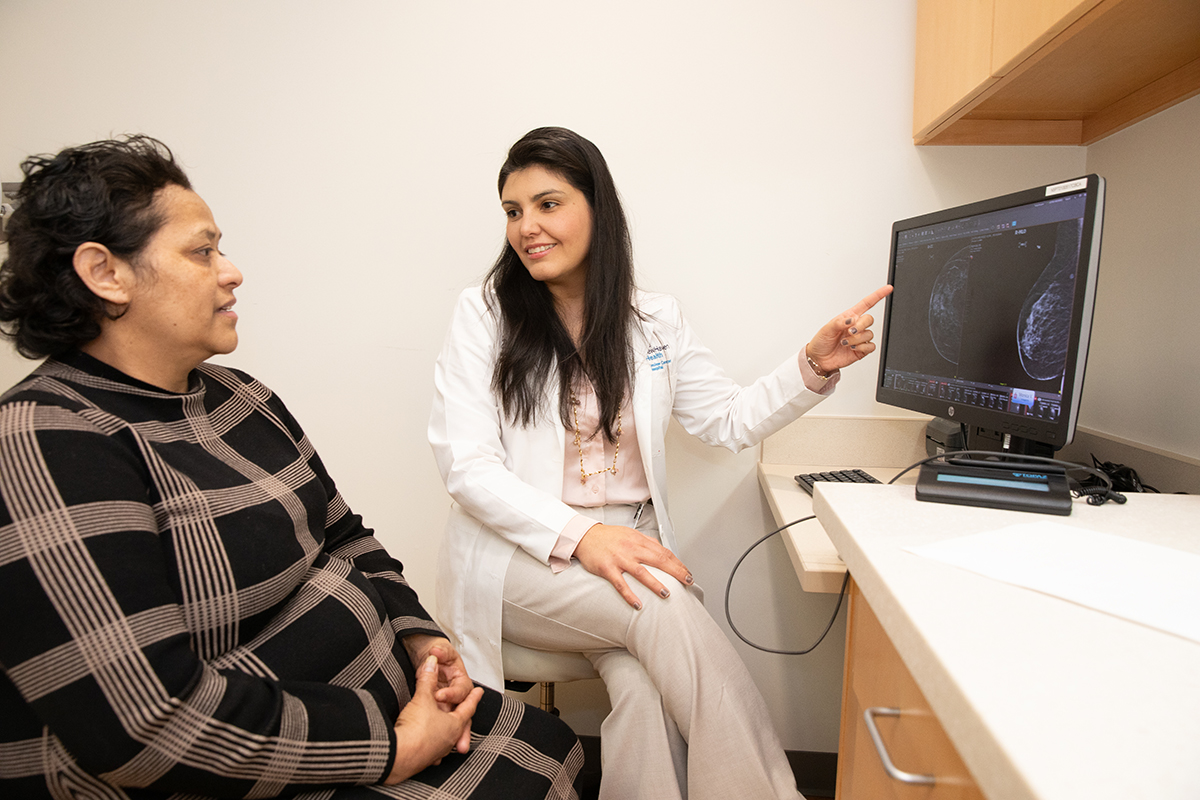
Popular Locations
- Outpatient Surgery - Bridgeport Hospital
- Park Avenue Medical Center
- Primary Care Center - Bridgeport Hospital


After learning she had breast cancer, Bridgeport resident Vilma Castro-Melendez was referred to the Hispanic Breast Cancer Program at Smilow Cancer Hospital at Trumbull, where she met with Director Monica Valero, MD, a surgical oncologist, who provided her with the clarity and culturally sensitive care she needed.
While a breast cancer diagnosis often is distressing and difficult to understand for many people, it can be even more confusing and frustrating for Hispanic patients who do not speak English. They are, however, finding clarity and culturally sensitive care at Bridgeport Hospital’s Hispanic Breast Cancer Program.
Since 2023, the Hispanic Breast Cancer Program – the first of its kind in Connecticut – has been breaking new ground while breaking down barriers to better meet the needs of a growing Hispanic population.
“We now have programs at the cancer center that allow our Hispanic patients to cope with barriers such as financial toxicity, childcare, education and navigation through the system,” said Monica Valero, MD, director of the Hispanic Breast Cancer Program and assistant professor of Surgery at Yale School of Medicine (YSM). “Our Hispanic patients benefit from added support of a culturally sensitive environment, which has played a meaningful role in helping to break down barriers to care.”
Breaking down the language barrier is the first step. In addition to translation services available onsite, many of the staff are bilingual.
“Since we started, one of our main goals has been to increase awareness of breast cancer and outreach among the Hispanic and minority populations,” Dr. Valero said. “We have many events and outreach programs where we go out to the community and provide educational talks.
“We also have the Mobile Mammography unit, which has been a valuable resource in providing remote mammography and ultrasound services to patients in the community — particularly those who may be hesitant or unable to visit the hospital.”
Soon after the program was implemented, Dr. Valero obtained grant funding from the American Cancer Society (ACS) to advance breast cancer care among the Hispanic population. The $40,000 grant supports the new pathway, S.T.R.E.A.M.L.I.N.E. — Streamlining Time-sensitive Referrals and Exams for Women with Abnormal Mammograms from Low-Income or No Insurance Racial and Ethnic Minority Groups.
It provides a patient-focused journey that includes culturally tailored education; assesses the need for funds, transportation, food insecurity, lack of insurance, childcare, and employment or housing insecurity; provides an anchor for providers across disciplines; and tracks timely follow-up imaging, biopsy and time-to-treatment.
“We’re using this funding to optimize breast cancer care by reducing the time between abnormal imaging and the completion of tissue biopsy and diagnosis,” Dr. Valero said.
The patient who inspired the need for such a pathway was a woman in her 40s who came to see Dr. Valero with a tumor in her breast measuring 10 cm. “I was really amazed,” Dr. Valero recalled. “She initially underwent breast imaging that revealed a breast mass. However, by the time she came to see me several months later, the mass had significantly increased in size, involving the entire breast. The extent of disease was significant, and I was struck by how many months had passed between abnormal imaging and the eventual biopsy.
“When patients undergo screening mammograms, they typically leave right after the exam,” Dr. Valero explained. “If an abnormality is detected, they are called back to undergo additional imaging, which may include diagnostic mammograms and/or breast ultrasound. If those diagnostic studies confirm an abnormal finding, a biopsy is often recommended, requiring yet another visit, usually on a different day to complete the workup.”
If the biopsy confirms a cancer diagnosis, the patient must then return to see a surgeon. “In today’s world, it is already challenging for anyone with a busy schedule to navigate multiple appointments with different providers,” she said. “Now imagine how much harder it is for patients who are uninsured, have low incomes and can’t afford to miss work, lack childcare or face language barriers.”
Dr. Valero said she plans to apply for additional funding from the ACS to take the pilot program to the next level, making it available to patients at each Smilow Cancer Hospital location.
“We aim to support patients at the point of initial screening or abnormal imaging by identifying those who may benefit from a more tailored and timely diagnostic workup in order to avoid missed or delayed opportunities that could impact prognosis,” Dr. Valero said.
Learn more about breast cancer services at Bridgeport Hospital and Smilow Cancer Hospital at Trumbull.